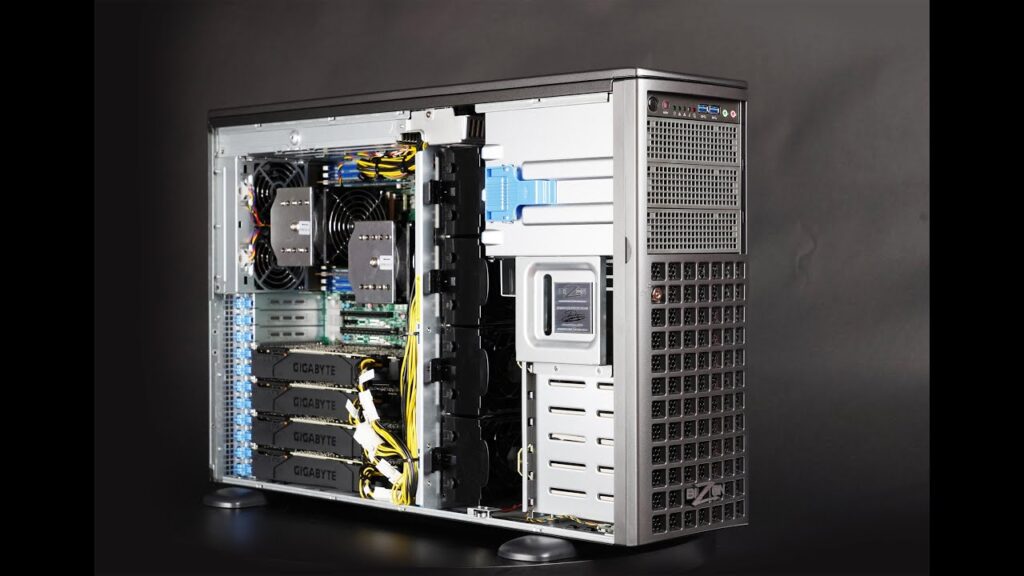
Xeon workstations are critical for AI development due to their exceptional performance and scalability. Designed for high-demand applications, Xeon processors offer multi-core capabilities, robust parallel processing, and advanced memory support, making them ideal for handling the complex computations required in AI tasks.
Whether it’s training deep learning models, running simulations, or processing massive datasets, Xeon workstations provide the reliability and power needed to accelerate AI workflows.
With their ability to handle intensive workloads efficiently, these workstations ensure faster results, higher accuracy, and the smooth execution of AI projects, making them an indispensable tool for AI researchers and developers.
Provides Powerful Performance For Complex AI Tasks
Xeon workstations are built to tackle demanding applications. AI development requires the ability to process large datasets, run simulations, and train machine learning models without delays. Xeon workstations are specifically designed to manage these intensive tasks efficiently. With the processing power of Xeon processors, these workstations can handle multiple tasks simultaneously.
- Multi-core capabilities: Xeon processors have multiple cores which allow them to perform multiple tasks at the same time. This is critical for AI algorithms that require heavy computation.
- Enhanced parallel processing: The architecture of Xeon processors makes them ideal for parallel processing. AI workloads can be distributed across multiple cores, speeding up development.
- High clock speeds: Xeon-based systems offer high clock speeds, enabling faster processing for time-sensitive AI tasks.
1. Offers You Both Stability And Reliability
When working on AI models or research, downtime is costly. Xeon-based systems are known for their stability, making them a preferred choice for professionals who cannot afford interruptions in their workflow.
- Error correction features: Xeon processors include features like ECC (Error Correcting Code) memory which helps in detecting and correcting errors in data processing. This is crucial when working with large and sensitive AI datasets.
- Robust hardware: Xeon-based systems are built with high-quality components designed to handle long hours of heavy usage without overheating or failing.
- 24/7 operations: These machines are built for continuous operation, which is often required during AI model training and testing.
2. Room Of for Growing AI Projects
AI projects are continuously evolving and growing, requiring computing resources that can scale along with them. They are designed to handle this kind of growth.
- Expandable memory and storage: Xeon systems allow users to easily expand memory and storage, which is essential as AI datasets grow larger and more complex.
- Multiple GPUs: For deep learning tasks, a workstation can be equipped with multiple GPUs to boost performance. This flexibility allows the system to adapt as AI projects scale up.
- Upgradeability: As AI development progresses, the demands on hardware will increase. It allows for hardware upgrades to keep up with these growing needs.
3. Superior Graphics Performance
AI development often involves complex simulations and visualizations that require powerful graphics processing. Xeon excels in this area by offering support for high-end GPUs.
- Optimized for AI workloads: Xeon processors are designed to work in tandem with high-end graphics cards, which are essential for AI tasks like deep learning, image recognition, and natural language processing.
- Powerful rendering capabilities: With powerful graphics support, these workstations can handle the heavy rendering required for AI-driven applications like 3D modeling and simulations.
- AI-focused graphics cards: Xeon systems are compatible with specialized AI GPUs that can accelerate machine learning tasks, making them even more efficient.
4. Efficient Data Management
In AI, data is king. Managing and processing vast amounts of data efficiently is essential for training accurate models. Xeon-based systems offer advanced data management capabilities to ensure smooth handling of large datasets.
Fast data throughput: With support for high-speed data storage and fast data transfers, it can keep up with the heavy demands of AI projects.
- Advanced RAID support: Redundant Array of Independent Disks (RAID) configurations can be used to protect and manage data storage, ensuring data integrity.
- Big data processing: AI development often requires working with big data. Xeon processors are equipped to handle the complex data management tasks that come with large datasets.
5. Cost-Effective In The Long Run
While Xeon-based systems may come with a higher initial cost, they offer long-term savings that make them a worthwhile investment for AI development.
- Energy efficiency: Xeon processors are optimized for energy efficiency, reducing power consumption and lowering operating costs.
- Longevity: These systems are designed for long-term reliability, meaning fewer repairs and replacements over time.
- Higher return on investment: The high performance and scalability of Xeon can lead to faster project completion, which in turn improves productivity and profitability in AI development.
Conclusion
Xeon workstations are essential for AI development due to their powerful performance, reliability, scalability, and efficiency. These machines are designed to handle the heavy computational demands of AI tasks, allowing developers to focus on building innovative solutions. Whether it’s for training machine learning models, managing large datasets, or running complex simulations, Xeon workstations provide the stability and performance needed to drive AI projects forward.
Read More : 5 Key Technical Aspects of Monitors That Are Often Overlooked






